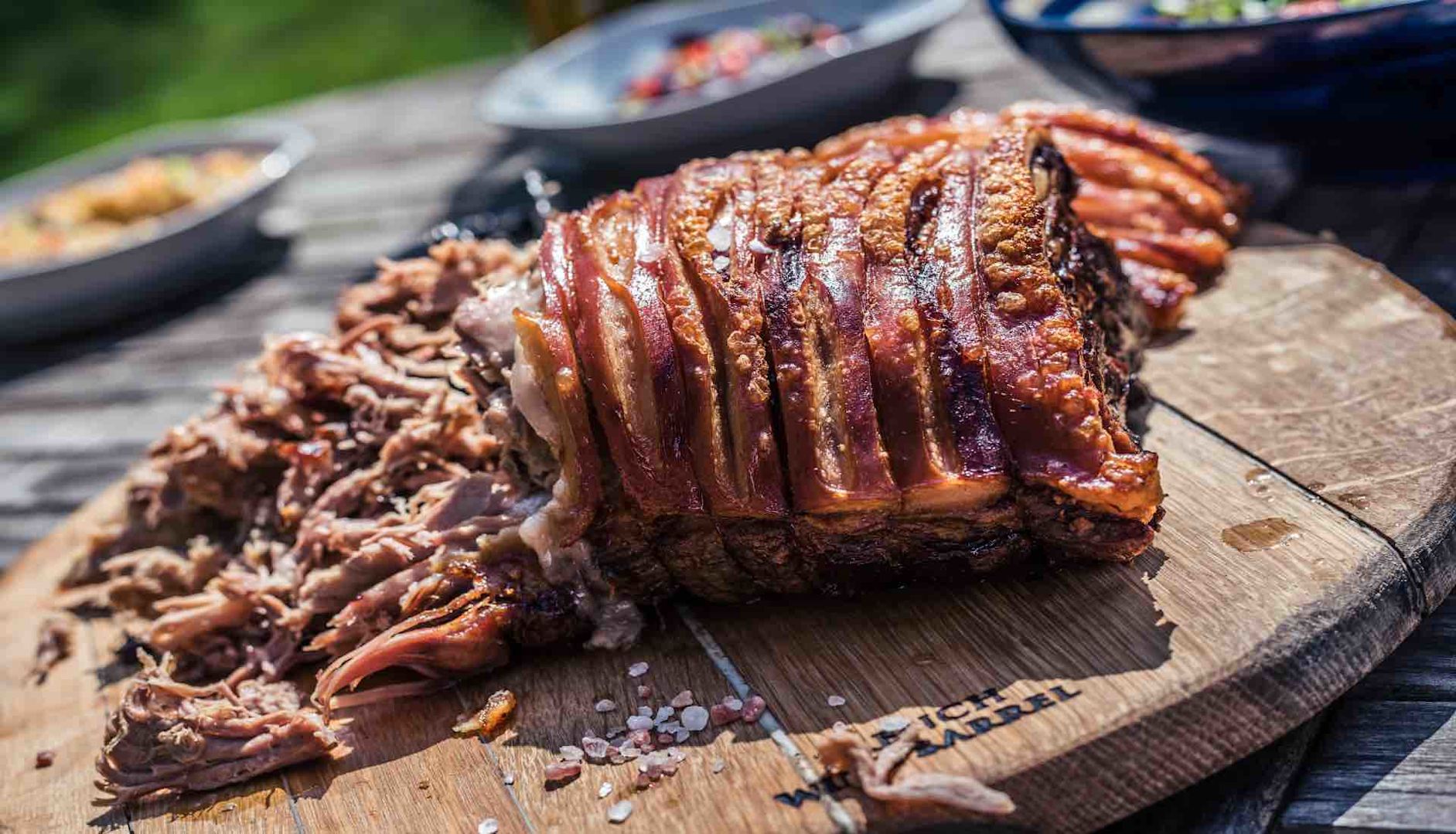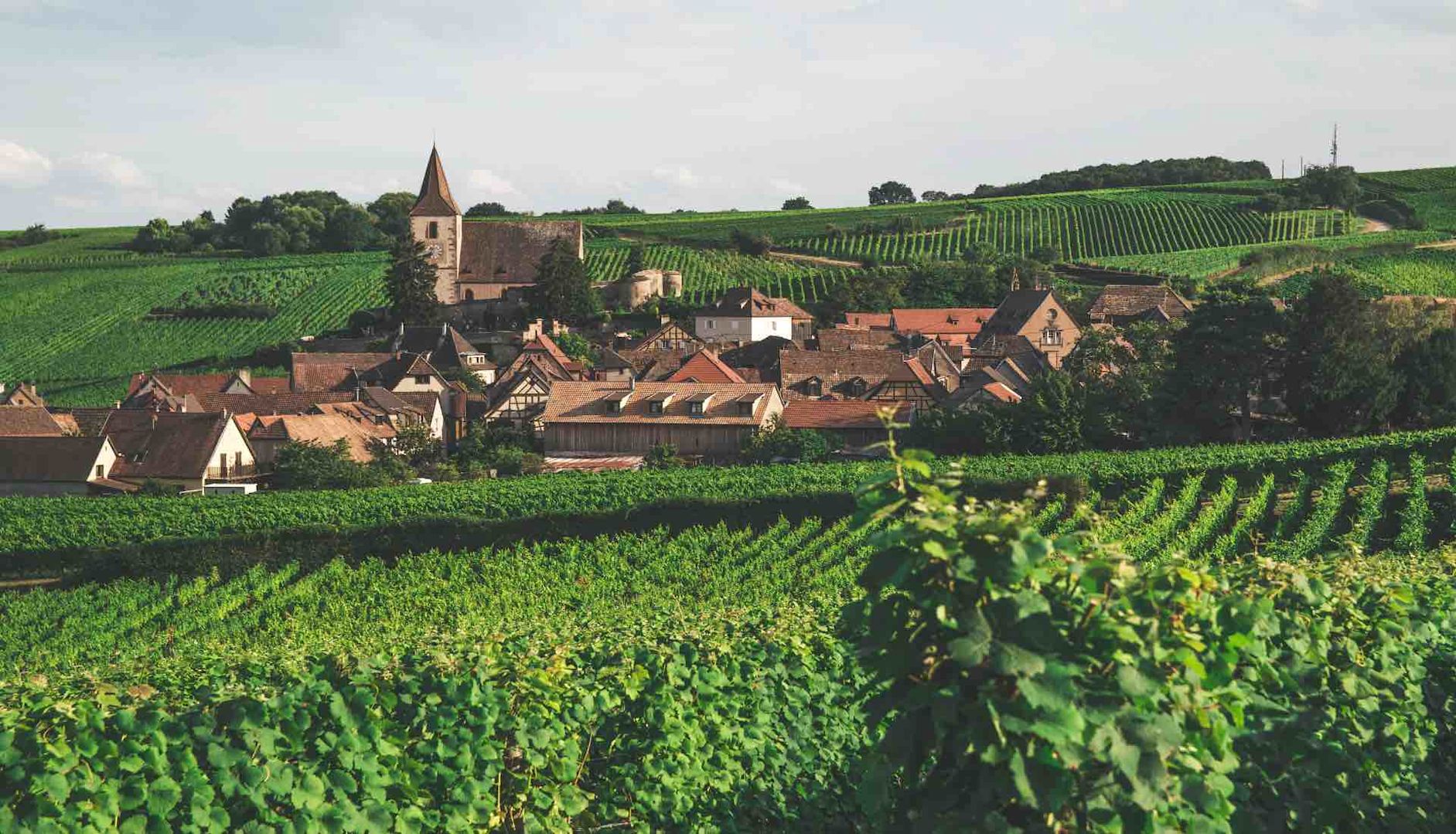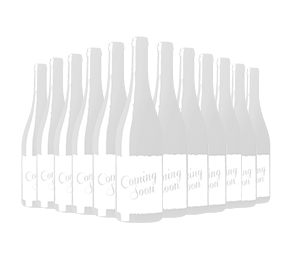Chat with Vinny
Pork is an incredibly versatile meat … there are varying cuts and flavour profiles, which means when it comes to wine, there’s a plethora of pairing possibilities.
From light and delicate to bold and robust, there are many different wine styles to suit the richness or seasoning of your pork dish. So, whether you’re grilling pork chops, enjoying tender roast pork, or indulging in pork belly, we’ve got you covered with a range of wine suggestions that will complement and enhance every bite.

Roast pork
When pairing wine with roast pork, there’s no real hard or fast rule. Ultimately, it comes down to personal preference … but for the best dining experience, it’s worth noting that Decanter recommends “rich whites or juicy reds”.
White wines to pair with roast pork
Roast pork and Chenin Blanc is a classic combination.
Chenin Blanc wines have plenty of green fruit flavours, including apple, pear and citrus. These flavours complement roast pork’s succulent flavours beautifully, especially when it's paired with condiments like apple sauce. Because Chenin Blanc boasts refreshingly high acidity, it cuts through the richness of roast pork, balancing out any fattiness, while enhancing the pork’s sweet and salty flavours.
If Chenin Blanc isn’t your style, a rich Chardonnay would also pair well. Chardonnay is incredibly versatile and often has ripe fruit flavours like apple, pear and peach, as well as tropical and citrus notes. These fruit-forward flavours complement the natural sweetness of the pork or the fruity elements in accompanying sauces. Plus, when a Chardonnay is aged in oak barrels, it develops a creamy, buttery texture which matches roast pork’s tender texture.
Red wines to pair with roast pork
If you decide to pair your roast pork with a red wine, Pinot Noir is a great choice due to its light body and bright acidity. Pinot Noir typically exhibits raspberry and cherry flavours, which complements pork’s savoury flavours without overpowering them.
Pork belly
Pork belly is quite fatty, so when choosing a wine to pair with this cut of pork, go for a high-acidity wine that will cut through the fat.
White wines to pair with pork belly
A dry white wine, like Riesling, is a great match for pork belly. It’s aromatic, with green fruit and tropical flavours, and is notoriously high in acidity. Because of this, Riesling wines can stand up to pork belly’s richness while acting as a palate cleanser.
Similarly, Viognier’s aromatic profile and stone fruit flavours make it an elegant choice when pairing with pork belly. It has a hint of sweetness and aromatic intensity that enhances the pork’s flavours, while also being a refreshing balance to the fatty richness of the meat.
Red wines to pair with pork belly
If you’re looking to pair a red wine with pork belly, Pinot Noir, Beaujolais, or Cabernet Franc wines from the Loire Valley are great matches. These wines are bright and juicy, smooth and supple, with low tannins, and are prized for their red-berry fruits flavours of raspberry, cherry and strawberry. These light and fruity reds are perfect for pairing with pork belly, as they won’t be easily overpowered by the pork’s richness and saltiness.
Sparkling wines to pair with pork belly
On the face of it, sparkling wine and pork belly may seem like an usual combination … but don’t overlook this pairing.
The effervescence and acidity of sparkling wines like Champagne or Prosecco make them an ideal partner to pork belly dishes. Champagne or Prosecco are crisp, with refreshing bubbles that cleanse the palate and work well alongside the salty flavours of pork belly.

Pulled pork
Pulled pork is a real crowd-pleaser … not only does it scream barbecue, but it’s tender, flavourful, and smothered in smoky sauce that just makes your mouth water.
White wines to pair with pulled pork
Grüner Veltliner is racy and aromatic, with a delightfully crisp, citrusy zing. And, because of its refreshing character, it’s an incredibly food-friendly wine.
Red wines to pair with pulled pork
A full-bodied wine with soft tannins, like Malbec, can be a great red wine match for pulled pork. It’s rich and hearty, with soft tannins and dark fruit flavours of cherry, raspberry, plum and blackcurrant. Often, Malbec can develop smoky notes from time in oak .... and this complements to smoky barbecue sauce used to season pulled pork.
You could also opt for Côtes du Rhône, a wine from France’s Rhône Valley. This red wine is typically a blend of Syrah, Grenache and Mourvèdre. Medium to full-bodied, you’ll find dark fruits, spice and a hint of earthiness. The spicy notes of Côtes du Rhône wines compliment the smoky flavours in pulled pork, making it another great pairing.
Or you could try a young Rioja. The strawberry and vanilla notes offset the smokiness of the sauce, making it another excellent match with pulled pork.

Gammon
While gammon is an underrated cut of pork, it’s certainly loved for its deliciously rich and salty flavours. In fact, gammon lends itself to anything – from festive dinners, classic pub dishes, or leftovers’ sandwiches.
White wines to pair with gammon
Riesling is an incredibly versatile grape. It can be light or full-bodied, bone dry or seductively sweet. But no matter the style of Riesling, one thing stays the same … it’s always high in acidity. With lush, crisp green apple flavours to delightful peachy sweetness, Riesling’s fruity and floral flavours and bright acidity cut through the richness of gammon, making it a great match for gammon.
Another great white wine pairing for gammon is Gewürztraminer. It can be sweet or dry and has a distinct aromatic flavour profile that balances well against the richness and saltiness of gammon.
Red wines to pair with gammon
If you’re pairing gammon with a red wine, I’d recommend choosing a fruity, light red – a wine that is low in tannins. You don’t want your red wine to become overpowered by the meat’s saltiness. Pinot Noir or Beaujolais are lighter styles, with smooth tannins and ripe, red fruits which pair beautifully with this meat.
Pork chops
Pan-frying, oven-roasting, or searing on the BBQ … there’s a range of ways to serve pork chops, each of them delicious. And when paired with the right wine, you’re guaranteed to enjoy each and every mouthful.
White wines to pair with pork chops
The high acidity of a Chenin Blanc or Riesling mean these wines pair well with pork chops. They cut through the pork’s richness and balance out the fattiness while enhancing the pork’s natural flavours.
A full-bodied Chardonnay also pairs well with pork chops. It’s rich texture and flavours complement the pork’s savoury taste and fatty texture. A Chardonnay’s buttery notes can also enhance the pork’s flavours.
Red wines to pair with pork chops
Malbec’s soft tannins and fruit-driven profile, along with the smoky and charcoal notes it can develop in oak, make it a great paring for pork chops.
You could also opt for a light to medium-bodied red such as Pinot Noir or Grenache. Pinot Noir is light and fruity, and its earthy notes can enhance the pork’s natural sweetness. Grenache, on the other hand, has a berry-driven profile and is slightly spicy … and this can stand up to the pork’s richness.
Sausages
Let’s not overlook the humble sausage – one of the most popular forms of pork! It’s an incredibly versatile food … and can be cooked and seasoned in a range of different ways. Of course, what wine you pair with sausage will depend on the seasoning.
White wines to pair with sausages
If you’re cooking pork sausages with fennel, or have a particularly apple-heavy dish, it would be best to pair with an aromatic white. For this, we’d recommend a Riesling or an off-dry Gewürztraminer.
Red wines to pair with sausages
If you were to season your sausage with black pepper, for example, if you were making the French dish Saucisse de Toulouse (Tolouse Sausage), a Californian Zinfandel or a Syrah from the Rhône Valley would be a fantastic pairing.
And for the classic bangers and mash? We’d recommend a fruity crowd pleaser like an Argentinian Malbec or an Aussie Shiraz.

Insider tip
My colleague Steve Rumble (you may have read some of his blogs on our site), has just returned from a lovely long weekend in Alsace. And since he returned, he hasn’t stopped talking about the delicious food and wines he sampled during his trip …
So, if you’re indulging in a classic pork platter with sauerkraut, he personally recommends pairing either Muscat or Pinot Gris.

Ready to find the wine for your pork dish? Check out our wide range of wines in all styles.
About the author
Brogan Wilson
Qualified to WSET Level 2 Wine, Brogan is a relatively new member of the team, having joined in September 2023. She previously worked as the sole copywriter at a creative marketing agency, and before that, as a primary school teacher. At Laithwaites HQ, you’ll find her growing her knowledge, asking lots of questions, and crafting both digital and print copy. An ardent red wine drinker, Brogan is also fond of Crémant.

